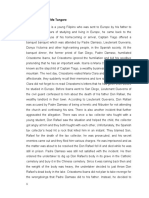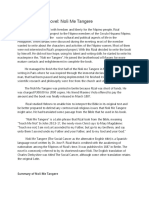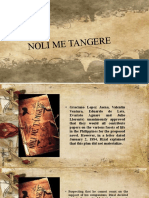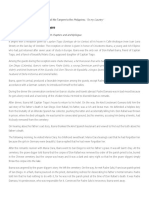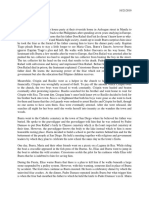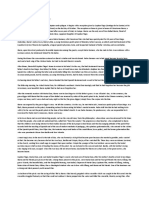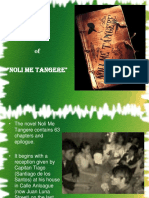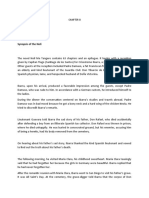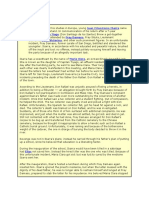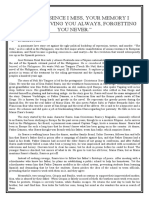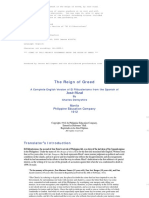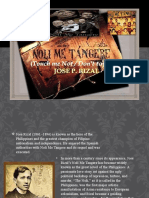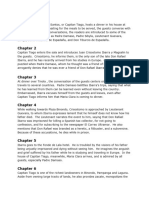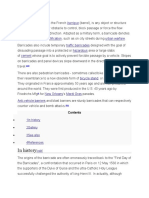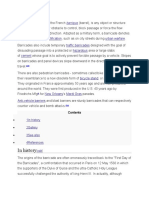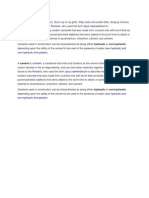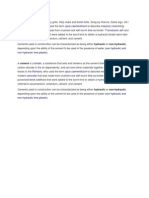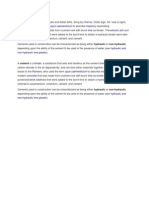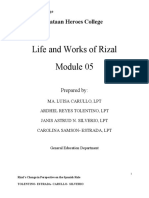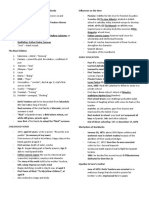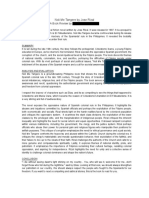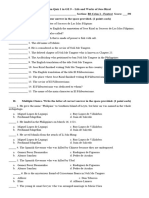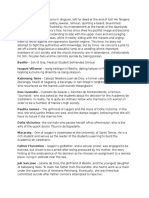Noli Me Tangere
Noli Me tangere is a novel written by Jose Protacio Rizal during the colonization of the
country by Spain to expose the inequities of the Spanish Catholic priests and the ruling
government. The title is Latin for "Touch me not", and is taken from John 20:17 in the Bible,
where a newly-risen Jesus admonishes a bewildered Mary Magdalene: "Touch me not; for I am
not yet ascended to my Father."
SUMMARY:
Chapter 1 A social gathering
Kapitan Tiyago hosted a striking occasion announced throughout San Diego and nearby towns of
Pasig and Binondo. Kapitan Tiyago's house was described as being in Daang Anluwage near
Binondo River. The news of the occasion was like a thunder that traveled all overinvited or not,
and everyone wanted to be at the party.
When the night came, the de los Santos house was full of merry-making. Visitors came from all
over and were being entertained by Kapitan Tiyago's cousin, Tiya Isabel. The hall room was full
of portraits of Saints and mirrors. Women and men were separated into separate seating
arrangements. Moreover, almost all of joy was in the circle of Tenyente Guevara (lieutenantgeneral of the Guardia Civil), Padre Sibyla (the parish curate of Binondo), Padre Damaso
(former curate of San Diego), Padre Salvi (the present curate of San Diego), Senyor Laruja and a
Spanish man with red hair.
While chatting, Padre Damaso mentioned the Indio (poor non Spanish people) idleness and
foolishness. The man with red hair counteracted Padre Damaso's comment that it may be the
Spanish people's supposition because the Spanish authorities wanted to conceal their incapability
with the colonial administration. Senyor Laruja, on the other hand, agreed with Padre Damaso.
With the red man's comment, Padre Damaso began to think that all other people in their circle
began to be dubious with him, he narrated his twenty years of living in San Diego. He said that
when he came to San Diego, the townsfolk greeted him with marching band, flower festival, and
plenty of food. When he left San Diego, however, few people only bid goodbye to himthe
hermano tercero (local official in a town government) and few crying old ladies. At this moment,
Padre Damaso grew red in anger and punched his chair. He shouted, "Are the curates free of their
own will or not?" He also mentioned that a curate must be free if he ordered to dig up the corpse
of a heretic to dispose it from a Catholic cemetery. He also noted that even the King of Spain
must not care if a curate do this.
Tenyente Guevara stood from his chair and retorted that the gobernador-heneral is the King's
representative to the Philippine Islands so he has the right to remove Padre Damaso from the
parish and throw him to another town, and that this was done because the former curate had the
corpse of a noble removed from his grave while his only son was in Europe.
After the debate, Padre Sibyla took the opportunity to calm the two, so peace returned in the hall.
Other visitors came later, including the couple de Espadaa. Donya Victorina wore a European
dress, which Guevara accidentally stepped on. Victorina was angered, to which Guevara only
replied that he was looking at her curly hair.
Then Kapitan Tiyago came and introduced a certain fresh good-looking man beside him.
Chapter 2 Crisostomo Ibarra
�The guests in the lobby continued to be merry and engaged in lively discussions. All of them
stopped and surprised to see Kapitan Tiyago arriving with Crisostomo Ibarra, who happened to
come from Europe. Few of them were impressed of this young man, Padre Damaso turned pale
and stared glaringly to Ibarra. The lieutenant never forget to greet the newcomers and the owner
of the house. Padre Damaso did not received Ibarra's offer to give him a handshake so he
managed to walk few steps behind and ignored them. When another man greeted Ibarra and
praised his deceased father, Padre Damaso obviously left the scene.
Nobody dared to introduce Ibarra to the young ladies, so he insisted to present himself to the
ladies through German customs. However, nobody paid attention to him. He went to the
gentlemen to introduce himself, again, this time, they were impressed by this young man. He saw
Kapitan Tinong and invited him to come over his house the next day for lunch, but he denied the
invitation saying that he needs to do more important appointment that day.
After a while, a maid entered the lobby and announced that the dinner is ready.
Chapter 62 Father Damaso explains
Maria Clara did not even pay attention to all the gifts piled up on top of her table for her wedding
for she had read the news that Crisostomo Ibarra was killed from the shooting happened at the
lake. While she was reading the news, Padre Damaso arrived to surprise her but he was the one
surprised when she began weeping. She told him about his last conversation with Ibarra, how she
had loved him very much; but she did not reveal that she already knew that she is the priests
biological daughter.
Maria Clara had hoped that even though Linares married her, Ibarra would one day come back
and take her away. But since Ibarra is dead, she thought there is no more reason to continue
living. And so she asked Padre Damaso to break the engagement and help her enter the nunnery.
Her decision grieved Padre Damaso, who apologized for what he had done. He tried to dissuade
Maria Clara from entering the convent but her mind is made up. It is the convent or death.
Seeing that her mind is made up, Padre Damaso consented with a heavy heart.
Chapter 63 Cristmas Eve
When Basilio was injured, he was brought into the mountains and nurtured by some unknown
people. There he stayed with them for two months while recovering from his injuries. On
Christmas Day, Basilio decided to go home and look for his mother, Sisa. The grandfather who
took care of him dissuaded him for his injuries have yet to fully heal, but seeing Basilios
determination and love for his mother, he gave him his blessings.
In town, Kapitan Basilio is congratulating Don Filipo for his good fortune for being unaccused of
revolting against the Spaniards. The latter was freed and only his books were burned down, while
others have lost more. In the middle of their discussion, they saw Sisa. Basilio explained that the
physician drove her out for fear of being associated with Ibarra.
Upon reaching San Diego, Basilio heard Sisas singing and ran towards her direction. A passerby
upon seeing him chase the madwoman threw a stone and hit him. When Basilio reached Sisa, the
latter did not initially recognize him but upon seeing the blood on his head caused by the stone,
she regained her senses and recognized him but immediately fell unconscious like Basilio
When Basilio woke up, he discovered her mother already dead. Elias also reached the scene,
tired and weak for not having any sleep and food for the past two days. He instructed Basilio to
�gather fire woods to burn their bodies and reminded him that should nobody come to dig the gold
buried, it is his to keep. When Basilio went away to gather the woods, Elias died.
El Filibusterismo
El Filibusterismo also known by its English alternate title The Reign of Greed, is the second
novel written by Jose Protacio Rizal. It is the sequel to Noli me Tangere.
SUMMARY:
Chapter 1 On the upper deck
It is a fine December morning and the steamship Tabo is sailing on the Pasig River on its way to
Laguna. On board the upper are his Excellency, the Captain-General, the jeweller Simoun,
Donya Victorina, Don Custodio, writer Ben-Zayb, and the friars, Padre Irene, Sibyla, Camorra
and Salvi.
The groups conversation turned to the lake. Donya Victorina, claiming superiority as always,
remarked that there is not a decent lake in the country. But Simoun quickly suggested to make a
new river-channel by digging a canal from the river, passing through Manila. This would save
land and shorten communication, and even prevent the formation of sandbar.
Others thought it was a splendid idea, except for Don Custodio, who out of habit, attacked the
project simply because it did not come from him. Ibarra answered all of his questions. His
project would use the prisoners and convicts in order to save on cost. If there arent enough of
them, increase the obligatory service from fifteen days to three or even four months.
When Don Custodio feared about an uprising, Simoun argued that the Egyptians and Jews did
not rebel. And the time or rebellion is already far away. He added that it is the job of the friars to
quell any rebellion.
Don Custodio, however, had another plan. He suggested all towns near the river would be
compelled to raise ducks since ducks will deepen the channel themselves by digging for snails.
When Donya Victorina heard about it, she feared that the ballot eggs will become abundant and
its better to have the bar closed up entirely.
Chapter 2 Below deck
Kapitan Basilio, Basilio, Isagani and Isaganis uncle, Padre Florentine were situated on the lower
deck along with several Chinese men. They were discussing about the youths ambition of
putting up a Spanish Academy. Despite the confidence of the youths, Kapitan Basilio expressed
pessimism, saying Padre Sibyla would oppose it.
Undeterred Basilio laid out their plans. Each student contributed funds. The professors are halfFilipinos and half-Peninsulares. And the house would be donated by their wealthy friend,
Makaraig. Their determination impressed Kapitan Basilio.
Isagani and Basilio continued their conversation. Isagani talked about how much he loves Paulita
Gomez, the niece of Donya Victorina. In order to continue seeing her, Isagani agreed to find her
husband Don Tiburcio, who is just hiding in his uncles house. They also talked about Simoun,
who invited the two youths for a drink of beer. When Simoun left, Basilio told him Simoun was
nicknamed the Brown Cardinal and the Black Eminence. They are interrupted when Isagani is
informed by a servant that his uncle, Padre Florentino needed him.
�The legend loving skipper of the vessel sees Padre Florentino and asks him to go on deck lest the
Friars assume this Filipino priest did not want to mingle with them. Padre Florentino then
instructs Isagani not to go near the lounge because that would be equal to abusing the hospitality
of the skipper who would surely invite Isagani. Actually, Isagani felt it was his uncles way of
preventing him from speaking with Donya Victorina.
Chapter 38 Fatality
While the guardia sibil were transporting a group of six or seven suspects, they were subjected to
abuse and torture. Carolino, who is new to the business, asked the others to just leave them
alone. One of the guardia sibil, Mautang revealed that theyre subjected to that kind of abuse so
they would be forced to escape. When that happens, they have a reason to shoot them.
All of a sudden, Mautang was shot dead by an unknown shooter. The others quickly retaliated by
shooting all the suspects and then open fired despite not knowing where their attackers are.
Carolino shot a man and the rest quickly made their retreat. Another man was shot by the other
guardia sibil. When they approached him, Carolino discovered that they shot Tandang Selo, his
grandfather.
Chapter 39 Conclusion
The injured Simoun had sought refuge at the house of Padre Florentino. The latter also received a
memo from the alferez notifying him that he is to be captured dead or alive. While under his
care, Simoun then shared his secret, revealing himself to be Juan Crisostomo Ibarra.
After he fled away, he became involved in the Cuban War selling to both sides. There he met the
Captain-General who was then a major. With his money, he was able to have the Generals
appointment in the Philippines, and used him as a tool to incite all kinds of injustice so that the
people would revolt.
In the end, Siomun had accepted his fate and realized that he was mistaken. After a lengthy
debate with Padre Florentino, Simoun had passed away from the effects of the poison he took.
Padre Florentino then took his chest, knowing that the guardia sibil will come and take it, threw
it towards the sea. Should man need it, God will draw it from the depth of the abyss.
Noli Me Tangere and El Filibusterismo
These two novels wrote by our national hero Dr. Jose Protacio Rizal are touted as the novels that
sparked a revolution. They are the barometer of the prevalent climate at the latter half of the
Spanish rule in the Philippines. Both novels has a profound effect on the Philippine society in
terms of views about national identity, the Catholic faith and its influence on Filipinos choice,
and the governments issues of corruption, abuse, and discrimination, and on a larger scale, the
issues related to the effect of colonization on peoples lives and the cause for independence.
The first novel, Noli Me Tangere is Latin for Touch me not. According to jose Rizal, the
prevailing culture of injustice and oppression during that time was a cancer that was killing
the Philippine society and culture. Noli Me Tangere laid the ground work for the two novels. And
in Noli Me Tangere, he gave the readers the view of the climate of Philippine society at that time.
The second novel, El Filibusterismo, the sequel of Noli Me Tangere, also known by its English
alternate title The Reign of Greed, is also a social commentary however, unlike the first novel,
Rizal further explored the avenue of revolution. The novels dark theme signifying the character
Crisostomo Ibarras resort to solving his countrys issues through violent means, after his
previous attempt at reforming the countrys system have made no effect and seemed impossible
with the attitudes of the Spaniards towards the Filipinos.
�In conclusion, both novels are similar for they made the Filipinos realize that they should fight
for their rights against Spanish oppression which brought the start of the revolution against the
Spaniards. And they only differ from their theme where Noli Me Tangere is more on emotion
(love of Crisostomo Ibarra for Maria Clara and love of a mother to her sons) while El
Filibusterismo is more on anger, vengeance, and revolts.
Republic of the Philippines
Northwest State Samar State University
Calbayog City
PROJECT
IN
SOCIAL SCIENCE 6
(LIFE AND WORKS OF
RIZAL)
Submitted to:
Mr. Jay Zeus E. Saliwan
Instructor
�Submitted by:
Jezza Figlia P. Bajet
BSCE - 5

